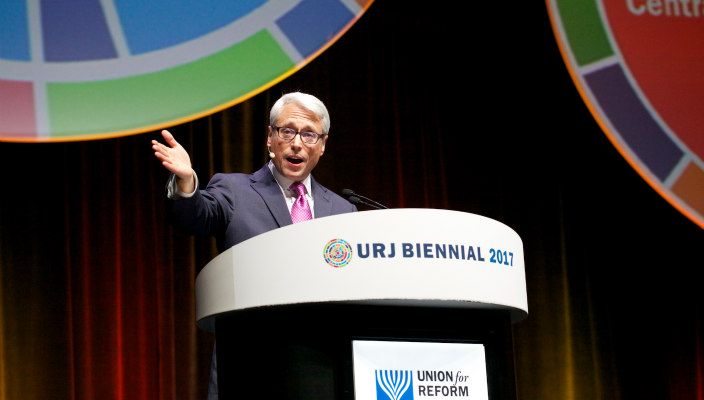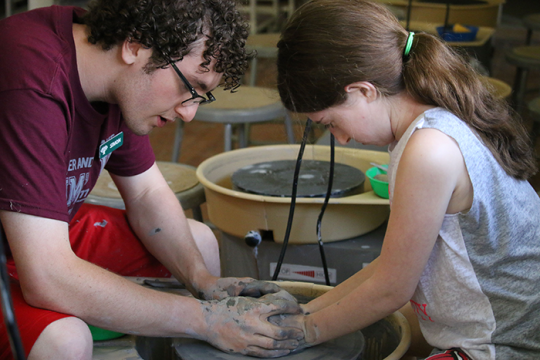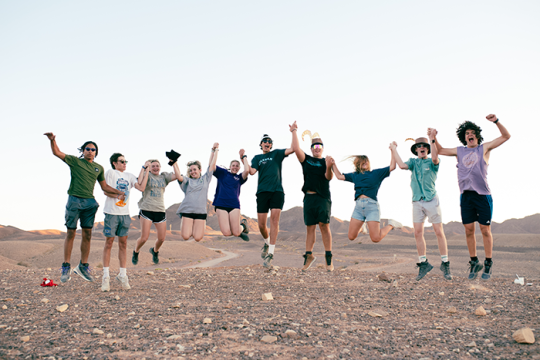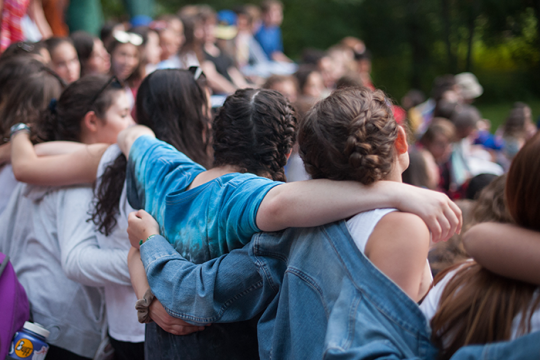
This address was presented before the 74th Union for Reform Judaism Biennial convention on Thursday, December 7.
I grew up in a rabbinic family, and it was our custom that when a visiting scholar would be at Temple for the weekend, my parents would host that speaker for Shabbat dinner before services on Friday night.
One unforgettable Shabbat, we were gathered at the dining room table for the blessings, eminent guest scholar included, and my father the rabbi called on my younger sister Elsie, then about 5 years old, to recite the motzi, which she did flawlessly. And that’s when my father, swelling with pride and pushing his luck, asked my sister, “And Elsie, when do we say the motzi?” To which she dutifully replied, “When we have company.”
Why is this Biennial so powerful? Because we have company. We are surrounded by thousands of other Reform Jews, from North America and around the world. Some of us are here in the company of memory, following the example of parents or mentors who showed us a living and vibrant example of this sacred work. We stand on mighty shoulders – of the rabbis who taught us, the lay leaders who inspired us, the beacons for justice who lit our way. We have company.
But company means something more tonight. It means every face you saw in that video, each personal testimonial we heard, every story you know of a kid who learned to live and love Judaism in one of our camps or programs, every NFTY kid at this convention.
Because those kids issue a reminder and a challenge to every grown up here: you may think you’re an empty-nester, but you’ve got company. You may think you have aged out of responsibility for creating a vibrant youth community in your congregation, but you’ve got company. You may work on the finance committee or the building committee so you think that youth is somebody else’s department. Well, guess what: Look at the screens and hear the stories. You have company, too.
Because children are not our future. They are our present. And the more we treat them not as hothouses to be experimented with to achieve some demographic end, but as living, breathing, laughing, thinking members of our communities, the better off they and we will be.
The more we ask them what they think about worship or Jewish learning, the more we put them on search committees and task forces, the more we invite them to be synagogue social justice interns for the summer or song leaders for the younger kids, they will help us be better at what we do.
And the more every single one of us accepts the responsibility to be company to them – to walk with them, to listen to them, to allow them their joy and allow them their pain, to teach them and love them and then love them some more, I believe the vaunted metrics will take care of themselves.
So here is another story from my childhood, about how my synagogue shaped my Jewish soul. But it is not about youth group, and it is not about camp. It is about a synagogue president.
Because when I was 13, the president of our congregation was an amazing man named Al Ronald. For my bar mitzvah, I received from Mr. Ronald an envelope, and in that envelope were twelve postdated checks, dated to the first day of the month for each month of the coming year. Each check was made out for ten dollars and signed by Mr. Ronald, but the “Pay to the Order Of” line was blank. In that same envelope was a handwritten note with my instructions – I was to choose a different tzedakah recipient each month, then fill out and send the check. Mr. Ronald forbade me to write him a thank-you note. Instead, I was to send him a periodic report indicating which charities I had chosen and why.
I was 13 years old. I had never filled out a check in my life. And because of Al Ronald, the first checks I ever wrote were for blessing. I still have the muscle memory of sitting at my desk in my mid-1970s suburban New York bedroom with the blue and green checked carpet and the smoked Lucite chandelier and filling out those checks each month. Part of the reason I am a rabbi today is because Al Ronald looked at me, and decided he had company.
Our kids need to know they are in our lives, and they need to know we are in theirs. Because we can all recite the litany of conditions they face: They are over-extended, over-programmed, with stress and anxiety as common companions. All the concerns we had as kids – about our appearance, our friends, what people did or didn’t think of us – are magnified by social media, by the screens which we sometimes worry have kidnapped their souls altogether.
And that is the glorious chutzpah of this movement and this night. Because in an age where kids are at risk for isolation, our Reform Movement has the spiritual creativity and courage to invite them into authentic connection.
In an age where kids feel like they have no time, we are going to show them how enriching their time can be.
In a generation where our Jewish kids somehow think that their achievements in the classroom or on the playing field exist independent of their Jewish identity, we are going to give them something called Six Points.
And in a consumerist culture which too often manipulates them and renders them passive, we are going to give them something called L’Taken, and the agency to make a difference for justice in the world.
And every time they feel alone, we are going to say, “You have company.” And maybe we’ll mean us. And maybe we will mean something far greater than we – maybe even a whisper of holiness – when the sun sets on a Friday night over an outdoor chapel, or a teacher listens, or a friend shows up at the door for a shiva minyan because they have learned that that’s what Jewish friends do.
So here’s another story. This one is from this past Sunday at Temple Emanu-El in Dallas. Our youth learning program was getting out at noon, and as I stood in the gathering space, I noticed a mom with kids in tow, the seven-year old brother and the five-year old brother fussing at each other. And just as the older brother was about to escalate the situation, he stopped in his tracks. Because coming the other way was his madricha, a high school senior who serves as the teaching assistant in his class. “Hey Jack, how’d you like our activity today?” Jack’s scowl turned to a completely awed smile: “It was fun!”
Because at the moment that young Jack was going to do something not particularly loving to his little brother, he realized: He had company. And his company was a cool teenager who knew who he was, and cared what he thought about throwing rubber balls into a barrel with some Jewish connection that I can no longer recall.
I stand here tonight not just as the child of Jack and Priscilla Stern or the student of Alfred Ronald or the proud parent of that high school senior I just mentioned. I am honored to speak with you as the president of the Central Conference of American Rabbis, and to tell you that our community of rabbis stands with you in standing with our kids.
Our rabbis at camp, our rabbis in Hillel, our rabbis who teach on college campuses or inspire teens from the pulpit or lead them to life-changing experiences in Israel, our rabbis who teach Confirmation and get good and silly at Tot Shabbat – we are with you and we are with our kids every step of the way. None of us can do it alone – not our kids, not our professionals, not our families. We need each other.
One more word about adult responsibility towards our kids – it begins with responsibility for our own Jewish lives. The great wisdom of the Federal Aviation Administration is that you put the oxygen mask on yourself first, and Jewish oxygen is no different. We will create the path to nurtured Jewish children by nurturing Jewish adults. As communities, we need to create meaningful Jewish learning for adults, inspire adults in prayer, challenge adults to justice, so they can model learning and prayer and acts of justice for our children.
There are no perfect recipes. But too often, when we talk about kids as our future, our passing of the Torah becomes a game of hot potato where we can’t wait to get it into the next set of hands. Our challenge as adults might be to spend at least as much time focused on embracing the Torah as we do on passing it. As rabbis, we are your partners in that sacred work.
So thank you: to the teens who make us better, to the adults who learn and grow with them. In this week’s Torah portion, the brothers of 17-year old Joseph throw him into a pit – they commit the grave sin of making a teenager invisible. That can’t be our way.
Thank you for seeing our kids – not just on the screens and on the stage and in the halls of the Biennial, but at your own kitchen tables, and in your own Temple board rooms, and in your own vision for what a community can be. Thank God they are in our lives, and thank God we are in theirs. Shout it from the rooftops: we have company. And as any 5-year old at Shabbat dinner can tell you, when we have company, great blessing is sure to come.
Rabbi David Stern is the senior rabbi of Temple Emanu-El in Dallas, TX, where he helps to lead a politically diverse congregation in the work of social justice. He currently serves as president of the Central Conference of American Rabbis.
Related Posts

Embracing Jewish Identity, Learning to Lead: The Lifelong Benefits of Working at Summer Camp

Empowering Tomorrow: The Enduring Impact of Youth & Teens in Reform Judaism's 150-Year Journey

